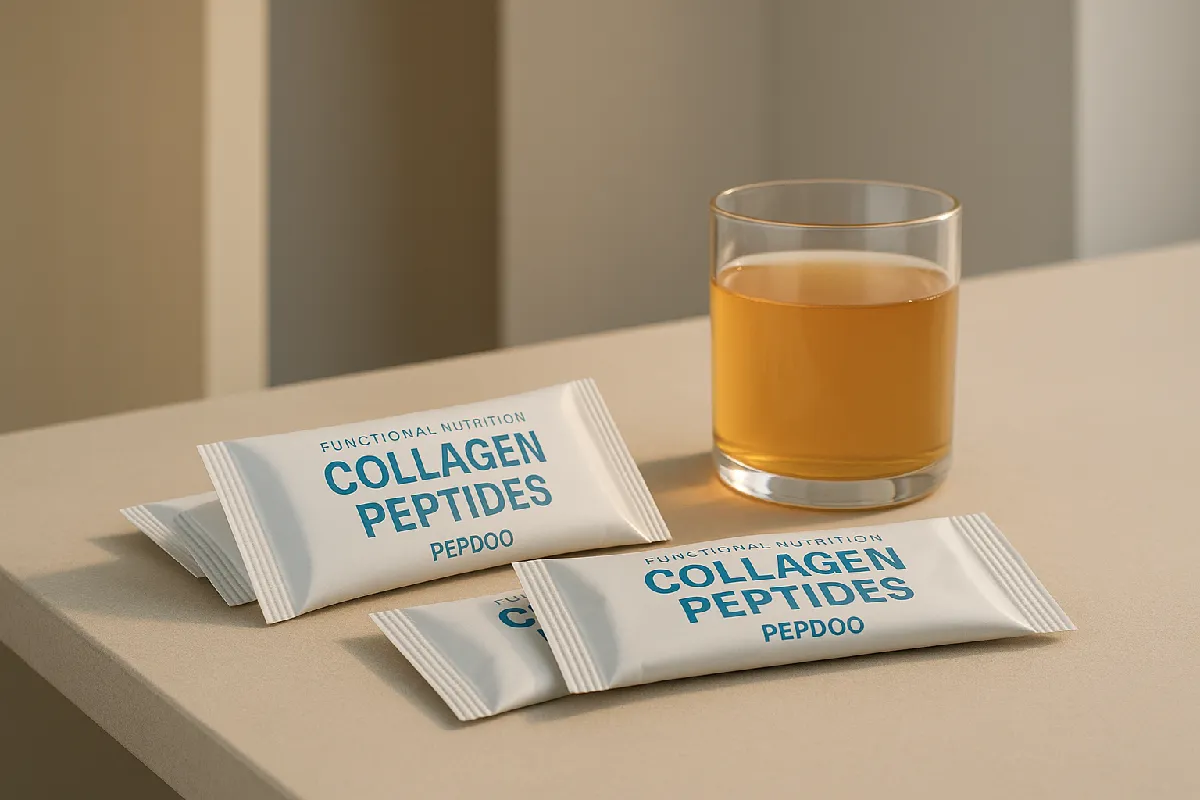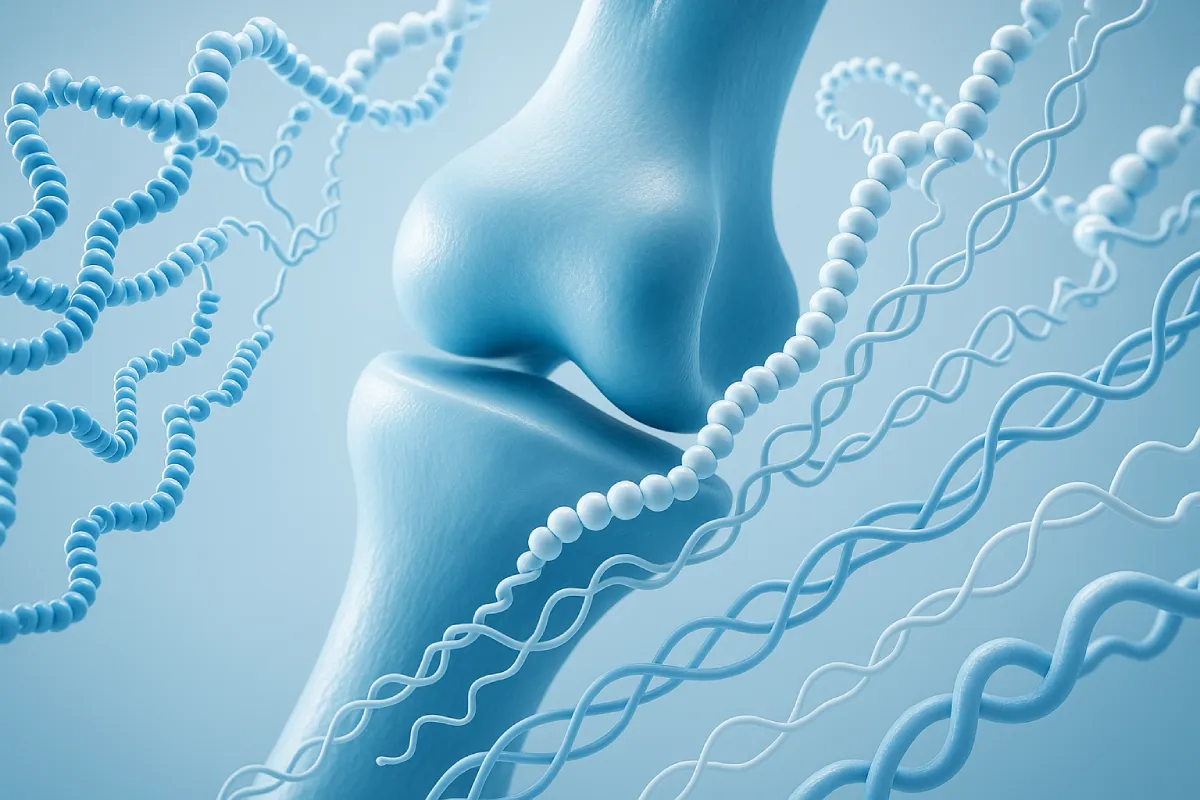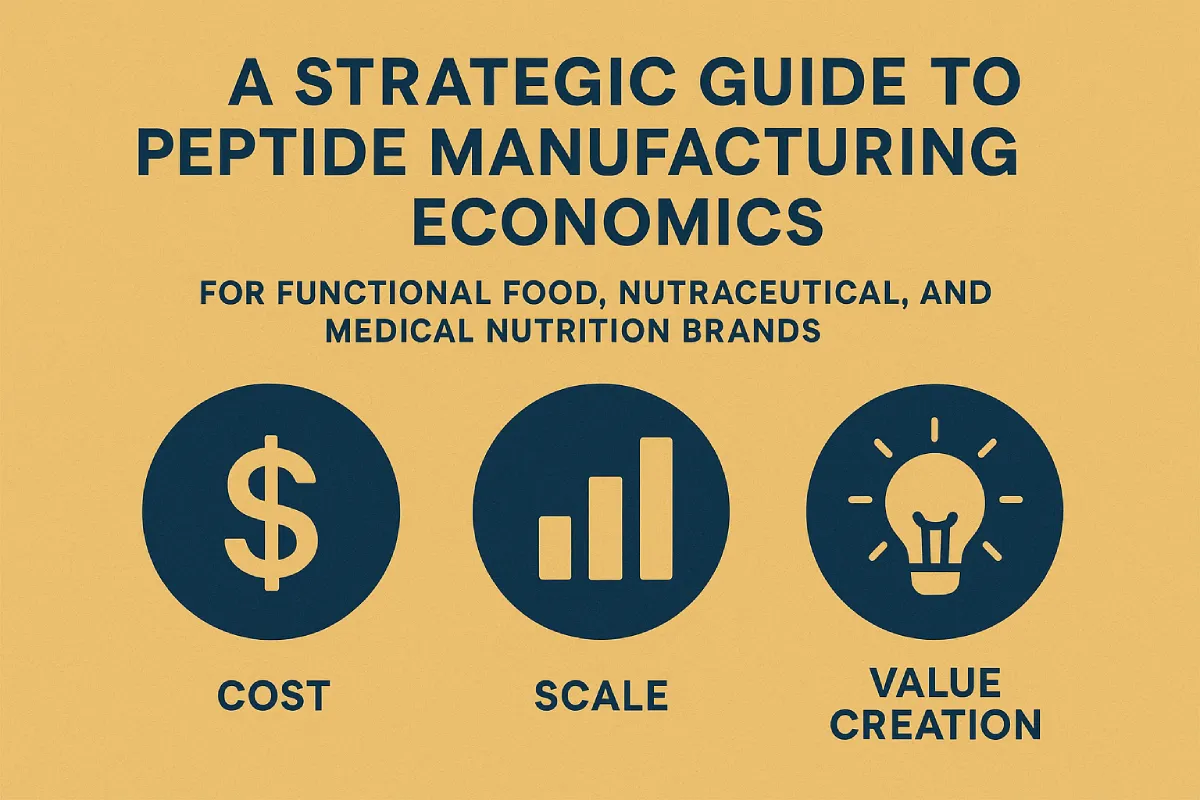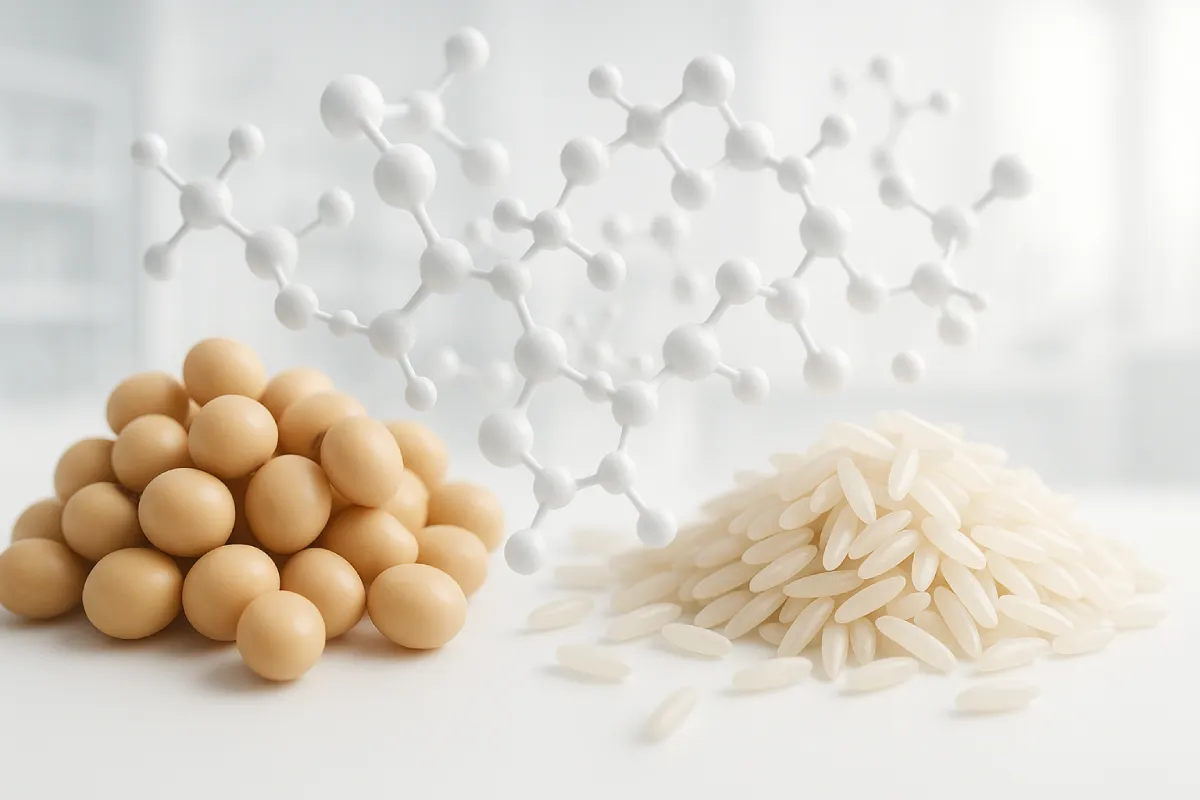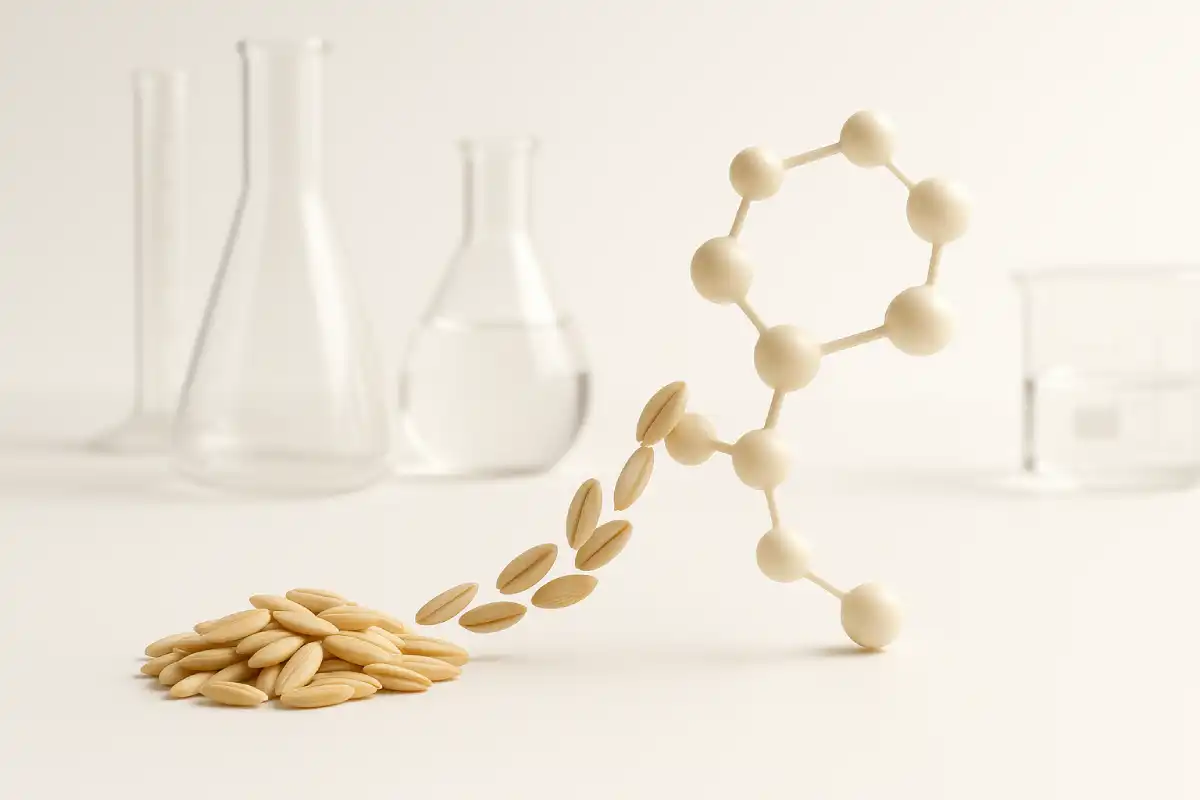Why Fish Collagen Peptide Matters in Functional Nutrition
The global functional nutrition and beauty-from-within market has expanded rapidly in recent years, driven by measurable claims, clinical validation, and consumer appetite for ingredients that demonstrate real outcomes. For brands and product developers focused on skin health, joint support, and clinical nutrition, fish collagen peptide offers a combination of superior bioavailability, neutral organoleptic properties, and formulation flexibility that makes it ideal for modern functional products [1].
As a trusted partner in the peptide industry, we are a full-category peptide manufacturer and China’s peptide industry standard setter. With one of the leading portfolios of small-molecule peptide patents in China and internationally advanced peptide manufacturing capabilities, we deliver hydrolyzed fish collagen peptides that meet strict B2B standards for quality, traceability,
Molecular Structure & Bioavailability of Fish Collagen Peptides
Fish-derived collagen is predominantly Type I collagen, the same collagen type abundant in human skin and bone. Through controlled enzymatic hydrolysis, long collagen chains are cleaved into low molecular weight peptides — often in the sub-1,000 Dalton range. These smaller peptides cross the intestinal barrier more readily and exhibit higher systemic bioavailability compared with larger peptide fractions or intact proteins [2].
Key compositional features that make fish collagen attractive for functional applications include:
- High glycine and proline content — essential amino acids in collagen biosynthesis.
- Smaller peptide fractions that show improved absorption kinetics.
- Low odor and good solubility profiles, which simplify incorporation into beverages and ready-to-drink formats.
For formulation teams, controlling the peptide molecular weight distribution is a primary determinant of both physiological efficacy and sensory acceptance. Manufacturers using advanced hydrolysis and membrane fractionation can deliver tight molecular weight specifications, which is particularly important for claims-driven products.
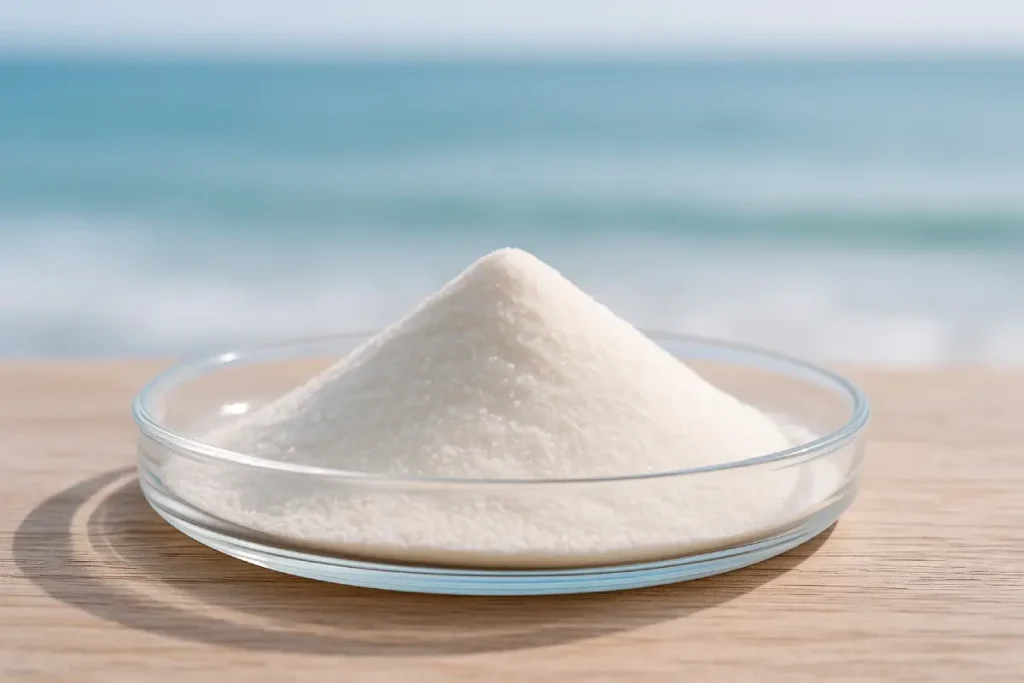
Production & Hydrolysis Technology: From Raw Material to Functional Peptide
Production begins with responsibly sourced fish skin and scales chosen for safety and traceability. Best-practice manufacturing employs low-temperature enzymatic hydrolysis to preserve bioactivity, followed by membrane separation and polishing steps to isolate peptide fractions with target molecular weight ranges.
Technological capabilities that impact final product quality include:
- Precise enzyme selection and controlled hydrolysis time/temperature to avoid over-degradation.
- Ultrafiltration and nanofiltration to obtain defined molecular weight cut-offs.
- Spray drying or low-temperature drying to preserve functionality.
Our manufacturing platform integrates China’s leading peptide technology with international best practices to ensure narrow molecular weight distribution, retained peptide activity, and reproducible batch-to-batch performance. This level of control supports claims substantiation and clinical study repeatability — critical for B2B customers aiming to make robust product claims.
Mechanisms of Action: The Science Behind the Benefits
1. Skin Health & Anti-Aging
Low molecular weight fish collagen peptides can stimulate dermal fibroblasts to enhance endogenous synthesis of collagen, elastin, and hyaluronic acid. Clinical evidence shows improvements in skin hydration, elasticity, and wrinkle depth following daily supplementation for 8–12 weeks, making fish collagen a compelling ingredient for beauty-from-within products [3].
2. Joint & Bone Support
Collagen peptides supply targeted amino acids that support cartilage matrix repair and may attenuate inflammatory signaling in joint tissues. When formulated with complementary actives such as calcium and vitamin D, collagen peptides contribute to multi-modal bone and joint health strategies — relevant for eldercare, sports recovery, and clinical nutrition portfolios [4].
3. Gut Health & Systemic Effects
Recent research indicates collagen peptides may play a role in gut barrier integrity and mucosal repair, which has implications for reducing systemic inflammation and improving nutrient absorption. These emerging mechanisms broaden the scope of collagen peptide applications beyond skin and joints, including in targeted medical nutrition and recovery formulas [5].
Quality Standards & Regulatory Compliance
Meeting B2B client expectations requires strict adherence to international quality and safety standards, including ISO, HACCP, GMP, FDA, and EFSA guidelines. Our fish collagen peptides undergo comprehensive testing for:
- Heavy metals
- Microbiological safety
- Allergen residues
Additionally, we offer Halal, Kosher, Non-GMO, and Marine Stewardship Council (MSC) certifications, ensuring compatibility with global market needs. As China’s peptide industry standard setter, we set benchmarks for purity, functionality, and safety in the collagen peptide sector.
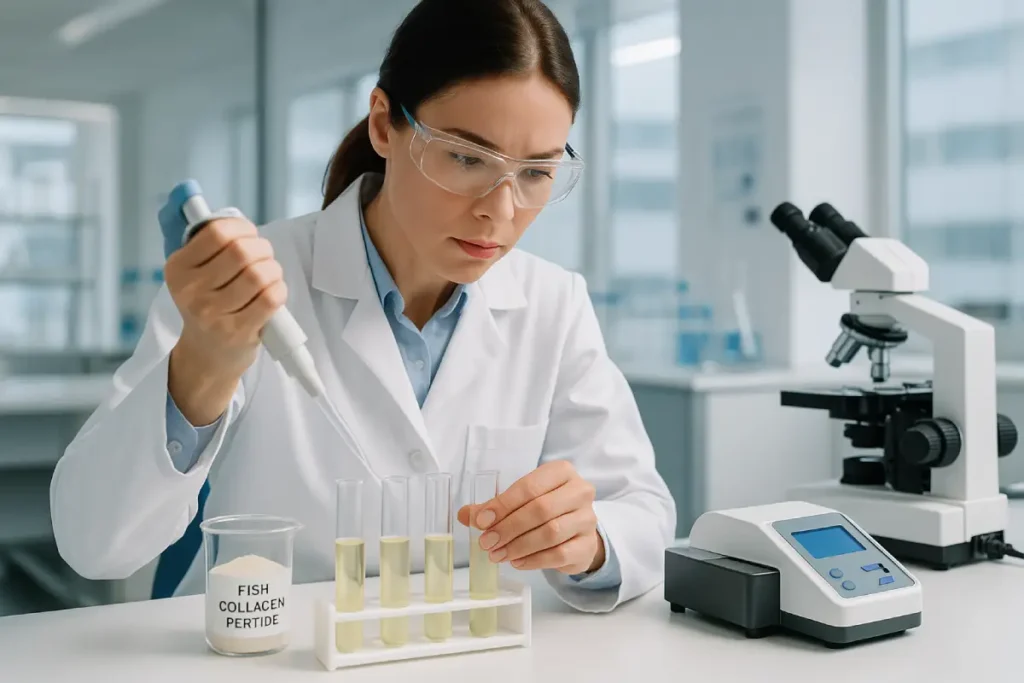
Applications in Functional Foods, Supplements, and Medical Nutrition
Functional Foods
Beauty beverages with anti-aging claims
Protein-enriched snacks and dairy products
Collagen-fortified gummies
Dietary Supplements
Powder sachets and stick packs
Ready-to-drink liquid ampoules
Capsules and tablets
Medical Nutrition
Post-surgical recovery formulas
Elderly nutrition blends for bone and joint health
Protein supplementation for clinical diets
Our ability to offer custom peptide blends means brands can combine fish collagen peptides with synergistic ingredients—such as hyaluronic acid, vitamin C, or elastin peptides—for enhanced product performance and differentiation in competitive markets.
Choosing the Right Fish Collagen Peptide Manufacturer
Selecting a manufacturing partner is critical for product success. Key evaluation points include:
- Technological capability for precise hydrolysis control
- Consistent product quality with reliable batch testing
- Scalability to meet market demand
- Custom formulation support
With full-category peptide production capacity, top-ranking small-molecule peptide patent holdings, and China’s leading peptide technology, we provide B2B partners with end-to-end solutions—from R&D to finished product support—ensuring both scientific credibility and market competitiveness.
Future Trends & Research Directions
Several trends will influence the fish collagen peptide market in the coming years:
- Personalized nutrition: Customized peptide blends adapted to age, activity level, or specific health conditions.
- Sustainability: Improved traceability and reduced waste through circular marine resource utilization.
- New functional axes: Research into gut-skin and immune-skin interactions could expand validated health claims.
- Cross-category innovation: Hybrid products combining marine peptides with plant-derived actives to meet clean-label demands.
We continue to invest in R&D and clinical validation to help our customers launch differentiated products built on robust science and scalable manufacturing practices.
Your Strategic Partner for Advanced Fish Collagen Solutions
Fish collagen peptides combine scientific credibility, formulation versatility, and strong consumer appeal. For B2B product developers in functional foods, supplements, and medical nutrition, selecting a raw material partner with precise molecular control, extensive quality systems, and applied R&D expertise is a decisive factor for commercial success.
As a full-category peptide manufacturer and China’s peptide industry standard setter with a leading portfolio of small-molecule peptide patents and internationally advanced manufacturing technology, we are positioned to provide end-to-end solutions — from custom peptide blends to clinical support and global regulatory documentation.
Partner with a Leading Fish Collagen Peptide Manufacturer
As a full-category peptide manufacturer and China’s peptide industry standard setter, we offer cutting-edge small-molecule peptide patents and internationally advanced production technology.
Request samples, technical documentation, and formulation support today.
FAQ
Most high-quality fish collagen peptides have a molecular weight between 500–3,000 Daltons, which enhances bioavailability and absorption efficiency [1]. Lower molecular weight ensures faster delivery to target tissues, such as skin, joints, and connective tissues—making it a preferred choice in functional food and nutraceutical formulations.
Fish collagen peptides are typically richer in Type I collagen and have superior bioavailability due to their smaller peptide size. This makes them especially suitable for skin health, beauty-from-within products, and certain medical nutrition applications. Bovine or porcine collagen may be preferred for joint health (Type II collagen), but fish collagen offers a cleaner, allergen-friendly profile [2].
Yes. Fish collagen peptides have excellent water solubility, neutral taste, and good stability under moderate heat, making them versatile for powders, ready-to-drink (RTD) beverages, gummies, and functional snacks. Our proprietary enzymatic hydrolysis technology ensures stable performance in both acidic and neutral pH environments.
As a full-category peptide manufacturer, China’s peptide industry standard setter, and a leader in small-molecule peptide patents, we apply GMP-grade production, ISO-certified quality control, and advanced enzymatic hydrolysis technology. Every batch is tested for molecular weight distribution, purity, microbial safety, and functional activity before shipment.
In most global markets, fish collagen peptides are classified as a food ingredient or dietary supplement component. Compliance with regional regulations (e.g., FDA in the U.S., EFSA in the EU, SAMR in China) is essential. We provide full documentation including specifications, safety data sheets, and functional claims support to facilitate regulatory submissions for B2B clients.
B2B brands can leverage fish collagen peptides in “beauty-from-within,” joint health, and sports recovery products, highlighting science-backed bioavailability and sustainability. Marketing angles can include clean-label sourcing, marine sustainability certifications, and clinical research evidence—enhancing brand trust and premium positioning.
References
[1] Kim, S. K., & Mendis, E. (2006). Bioactive compounds from marine processing byproducts – A review. Food Research International, 39(4), 383–393.
[2] Liang, J., Pei, X., Zhang, Z., Wang, N., Wang, J., Li, Y., … & Hu, Q. (2010). The protective effects of long-term oral administration of marine collagen hydrolysate from chum salmon on collagen matrix homeostasis in the chronological aged skin of Sprague–Dawley male rats. Journal of Food Science, 75(8), H230–H238.
[3] Proksch, E., Schunck, M., Zague, V., Segger, D., Degwert, J., & Oesser, S. (2014). Oral intake of specific bioactive collagen peptides reduces skin wrinkles and increases dermal matrix synthesis. Skin Pharmacology and Physiology, 27(3), 113–119.
[4] Clark, K. L., Sebastianelli, W., Flechsenhar, K. R., Aukermann, D. F., Meza, F., Millard, R. L., … & Albert, A. (2008). 24-Week study on the use of collagen hydrolysate as a dietary supplement in athletes with activity-related joint pain. Current Medical Research and Opinion, 24(5), 1485–1496.
[5] Bello, A. E., & Oesser, S. (2006). Collagen hydrolysate for the treatment of osteoarthritis and other joint disorders: A review of the literature. Current Medical Research and Opinion, 22(11), 2221–2232.


